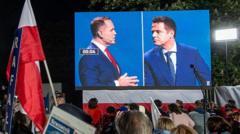As Poland gears up for its presidential election, opinion polls suggest that the leading candidates are Warsaw's liberal mayor Rafal Trzaskowski and historian Karol Nawrocki of the national-conservative camp, with the potential for a significant political transformation.
Poland's Presidential Election: A Tight Contest between Liberalism and Conservatism

Poland's Presidential Election: A Tight Contest between Liberalism and Conservatism
Polish voters prepare for a divisive presidential election, reflecting decades of political polarization.
The stage is set for an intense battle on Sunday, as polls indicate that a second round will likely be necessary to determine Poland's next president. The two main candidates, Rafal Trzaskowski and Karol Nawrocki, represent starkly contrasting political ideologies. Trzaskowski, the liberal mayor of Warsaw, is backed by Donald Tusk's Civic Platform (PO), while Nawrocki represents the opposition Law and Justice (PiS) party, which ruled prior to the recent shift in power.
The outcome is crucial, as Poland's presidency wields veto power over governmental legislation. With outgoing President Andrzej Duda unable to run again after two terms, the balance of power may be jeopardized, presenting the potential for radical changes in the political landscape. Tusk’s coalition, while currently in charge, lacks the necessary parliamentary majority to override a presidential veto should Nawrocki win.
Critics of PiS have accused them of authoritarian tendencies and politicizing public institutions, while the new government led by Tusk has faced backlash for not fully delivering on campaign promises, such as reforms surrounding abortion and migration policy. Supporters of Trzaskowski, like Green party member Miroslaw Kaznowski, express disappointment in the coalition's shift towards right-leaning policies, fearing a regression to authoritarianism.
The candidates' contrasting approaches have fueled a heated campaign, particularly around social issues. In a recent debate, Nawrocki challenged Trzaskowski on LGBTQ+ rights, a moment that has resonated deeply within an electorate eager for progressive change but wary of returning to conservative rule.
Escalating tensions around security policies, particularly in response to the war in Ukraine and migration issues, have become central to the candidates' platforms. Tusk's administration has aimed to present a unified front against PiS's narrative on national security. Nonetheless, local opinions are mixed, with voters expressing frustration towards the longstanding dominance of both Tusk and Kaczynski in Polish politics.
In a landscape where younger candidates have emerged, such as the far-right libertarian Slawomir Mentzen, traditional party support is being tested. Mentzen’s brief rise, powered by anti-immigration sentiment, has dwindled due to controversial statements on critical social issues. Many voters voice a desire for a shift away from the entrenched duopoly.
As the election approaches, sentiment across Poland reflects a yearning for fresh perspectives in governance. Citizens are split, navigating their discontent with the current political climate, and looking to the presidential polls as a potential turning point for the future of democracy in Poland. The upcoming election signifies more than just a choice between candidates; it symbolizes the ongoing struggle between liberal values and conservative ideologies in shaping the Polish identity.
The outcome is crucial, as Poland's presidency wields veto power over governmental legislation. With outgoing President Andrzej Duda unable to run again after two terms, the balance of power may be jeopardized, presenting the potential for radical changes in the political landscape. Tusk’s coalition, while currently in charge, lacks the necessary parliamentary majority to override a presidential veto should Nawrocki win.
Critics of PiS have accused them of authoritarian tendencies and politicizing public institutions, while the new government led by Tusk has faced backlash for not fully delivering on campaign promises, such as reforms surrounding abortion and migration policy. Supporters of Trzaskowski, like Green party member Miroslaw Kaznowski, express disappointment in the coalition's shift towards right-leaning policies, fearing a regression to authoritarianism.
The candidates' contrasting approaches have fueled a heated campaign, particularly around social issues. In a recent debate, Nawrocki challenged Trzaskowski on LGBTQ+ rights, a moment that has resonated deeply within an electorate eager for progressive change but wary of returning to conservative rule.
Escalating tensions around security policies, particularly in response to the war in Ukraine and migration issues, have become central to the candidates' platforms. Tusk's administration has aimed to present a unified front against PiS's narrative on national security. Nonetheless, local opinions are mixed, with voters expressing frustration towards the longstanding dominance of both Tusk and Kaczynski in Polish politics.
In a landscape where younger candidates have emerged, such as the far-right libertarian Slawomir Mentzen, traditional party support is being tested. Mentzen’s brief rise, powered by anti-immigration sentiment, has dwindled due to controversial statements on critical social issues. Many voters voice a desire for a shift away from the entrenched duopoly.
As the election approaches, sentiment across Poland reflects a yearning for fresh perspectives in governance. Citizens are split, navigating their discontent with the current political climate, and looking to the presidential polls as a potential turning point for the future of democracy in Poland. The upcoming election signifies more than just a choice between candidates; it symbolizes the ongoing struggle between liberal values and conservative ideologies in shaping the Polish identity.





















